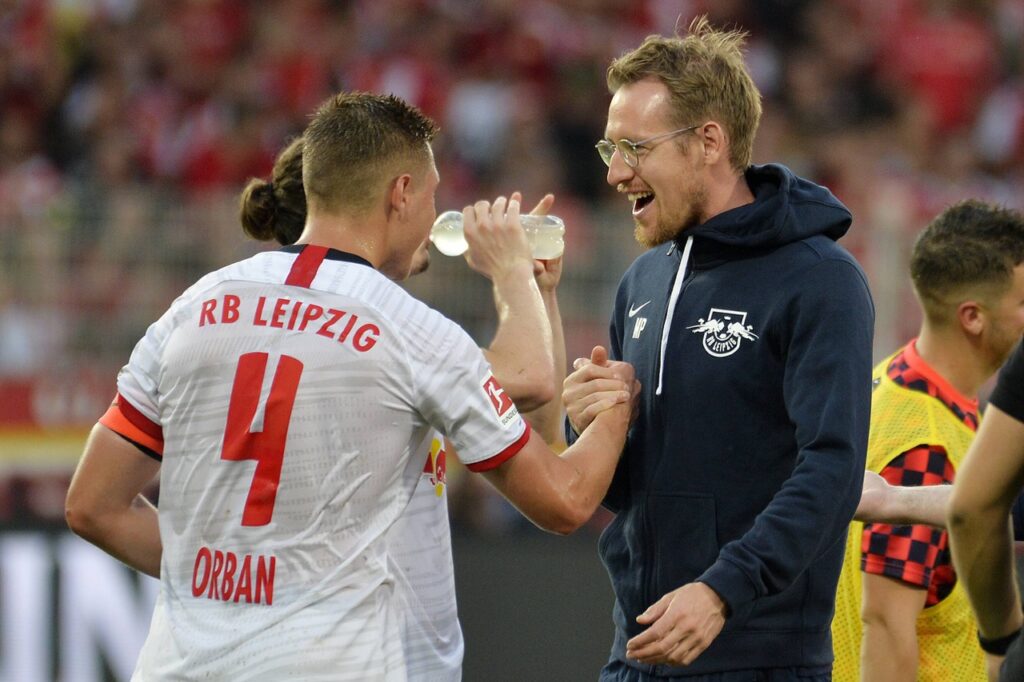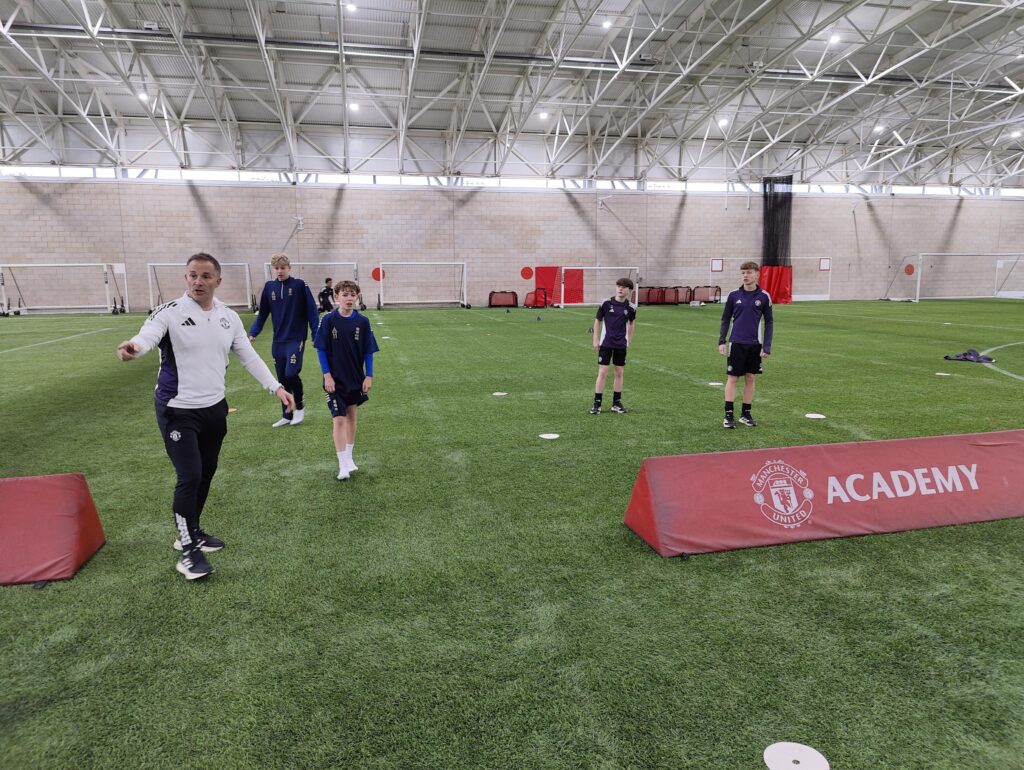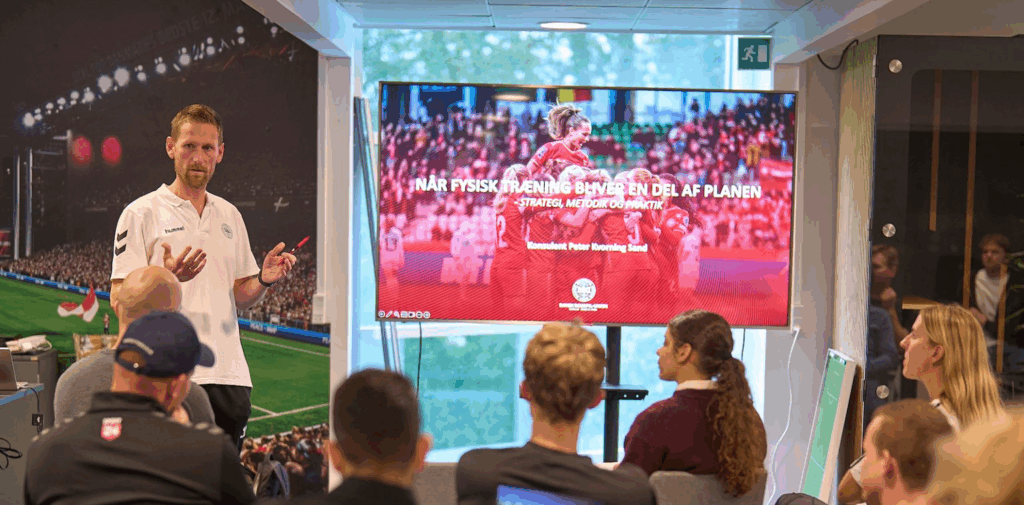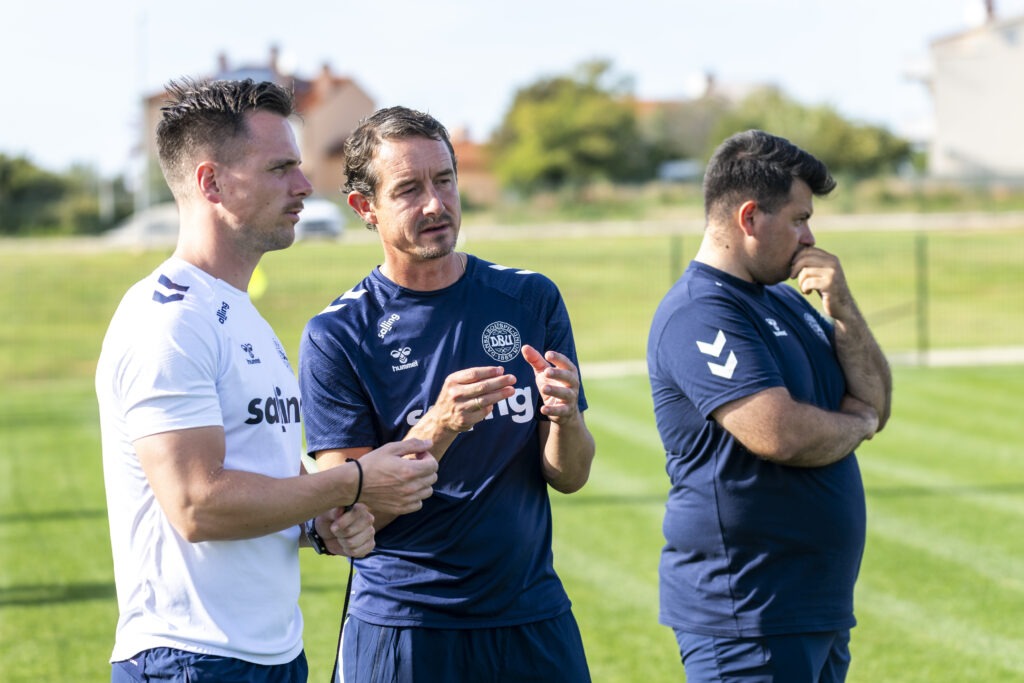Read in English below.
Maximilian Pelka er en af de mest anerkendte sportspsykologer i professionel fodbold. Han har blandt andet arbejdet i RB Leipzig og Bayern München og samarbejdet tæt med Julian Nagelsmann.
Over en årrække har Pelka udviklet en innovativ og holistisk tilgang til mentaltræning og præstationsstrategier til både spillere og trænere. Hans tilgang fokuserer på at styrke den mentale robusthed gennem individualiserede teknikker såsom visualisering og vejrtrækningsøvelser, samtidig med at han arbejder med holdet som en samlet enhed for at fremme positiv dynamik og sammenhængskraft.
I denne Q&A får du et indblik i Pelkas erfaringer fra toppen af europæisk fodbold, og hvordan han hjælper spillere med at håndtere pres, opbygge selvtillid og præstere på deres allerhøjeste niveau – både individuelt og som en del af holdet.
Artiklen tager afsæt i hans oplæg under Football Performance Summit 2025, som Divisionsforeningen og SDU afholder.
|
Question |
Answer |
| Kan du beskrive et specifikt eksempel på, hvordan du arbejder med både individuelle spillere og holdet som helhed for at optimere dynamik og præstation? | I min tilgang fokuserer jeg på at skabe et miljø, hvor både individuelle spillere og holdet som helhed tager ansvar for at optimere dynamik og præstation.
For eksempel arbejder jeg tæt sammen med spillere individuelt for at hjælpe dem med at udvikle deres lederevner. Dette inkluderer træning i at støtte nye eller mindre erfarne holdkammerater, uddannelse om kulturelle forskelle for at fremme inklusion og understregning af vigtigheden af social støtte i gruppen. Ved at identificere og styrke nøglepersoner, som naturligt påvirker andre, forsøger jeg at sikre, at de fungerer som rollemodeller og katalysatorer for positiv holdkultur. Dette dobbelte fokus på individuel udvikling og teamsammenhæng skaber et feedback-loop, hvor holdet og individet styrker hinanden. |
| Hvordan integrerer du psykologiske teknikker i træningsrutiner for at styrke spillernes mentale robusthed og præstation? | Jeg integrerer psykologiske teknikker i træningsrutiner ved at opretholde åben kommunikation med spillerne, stille spørgsmål og forstå deres individuelle behov og interesser.
Mange spillere er åbne for nye idéer, så jeg foreslår ofte teknikker som visualiseringsøvelser før kampe eller vejrtrækningsstrategier for at forbedre fokus og ro. Derfra arbejder vi sammen om at tilpasse og finjustere metoderne. Det er en proces med forsøg og fejl – nogle metoder passer til spillerens stil, mens andre måske ikke gør. Nøglen er at finde individualiserede løsninger, der er både praktiske og effektive for hver enkelt spiller, da det hjælper med at opbygge mental robusthed og forbedrer præstationen. |
| Hvordan har dine erfaringer i RB Leipzig og Bayern München formet din tilgang til mental præstation i moderne fodbold? | Meget kort; Min tid i klubberne gjorde mig opmærksom på det enorme pres, som både spillere og stab er under i disse miljøer. |
| Hvad ser du som de største udfordringer for spillere i elitefodbold i forhold til mental styrke, og hvordan hjælper du dem med at overvinde disse? | De største udfordringer for spillere i elitefodbold er selvtvivl og at håndtere de forventninger, der bliver stillet til dem – fra trænere, holdkammerater, fans og medier. Disse eksterne pres påvirker ofte deres egne forventninger og skaber en mental byrde, der kan påvirke både præstation og trivsel. For at hjælpe spillerne fokuserer jeg på at guide dem til en bedre forståelse af sig selv. Dette indebærer støtte i en rejse mod selvindsigt, hvor de identificerer deres kerneværdier og motivation. Jeg tror, at spillere, der virkelig kender sig selv og forbliver tro mod deres værdier (selv i modgang) kan præstere maksimalt og samtidig bevare deres mentale sundhed. |
Maximilian Pelka: My experiences as Sports psychologist in RB Leipzig and FC Bayern München
Maximilian Pelka is one of the most recognized Sports psychologists in professional football. He has worked at RB Leipzig and FC Bayern München, among others, and worked closely with Julian Nagelsmann.
Over the years, Pelka has developed an innovative and holistic approach to mental development and performance strategies for both players and coaches. His methodology emphasizes strengthening mental resilience through personalized techniques like visualization and breathing exercises, while fostering positive team dynamics and cohesion.
In this Q&A, Pelka shares his experiences from the pinnacle of European football, providing insights into, how he helps players manage pressure, build confidence, and perform at their highest level. Both individually and as part of a team.
The article draws on his presentation at the Football Performance Summit 2025, hosted by the Danish Divisionsforeningen and SDU.
|
Question |
Answer |
| Can you describe a specific example on, how you work with both individual players and the team as a whole to optimize dynamics and performance? | In my approach, I focus on creating an environment where both individual players and the team as a whole take responsibility and accountability for optimizing dynamics and performance. For example, I work closely with individual players to help them develop their leadership skills. This includes training them to support new or less experienced teammates, educating them on cultural differences to foster inclusivity, and emphasizing the importance of social support within the group.
By identifying and empowering key individuals who naturally influence others, I try to ensure they serve as role models and catalysts for positive team dynamics. Players often have a much greater impact on each other than coaches can, so I leverage this peer influence to drive change. For instance, when key players model supportive behaviors, the entire team culture shifts toward collaboration and mutual respect.
This dual focus on individual growth and team cohesion creates a feedback loop: as players grow in their leadership and interpersonal skills, the team becomes stronger and more unified, which, in turn, supports each individual in reaching their potential. |
| How do you integrate psychological techniques into training routines to enhance players’ mental resilience and performance? | I integrate psychological techniques into training routines by maintaining open communication with players, asking questions, and understanding their individual needs and interests. Many players are eager to explore new ideas, so I often propose techniques like imagery scripts for pre-match routines or breathing strategies to enhance focus and composure.
From there, we work collaboratively to adapt and refine these approaches. It’s a process of trial and error—some methods resonate and become part of a player’s routine, while others may not suit their preferences or environment. The key is finding individualized solutions that fit each player’s unique style and circumstances, ensuring that any technique adopted is both practical and effective for them. This is an example for an approach that helps building mental resilience and enhances overall performance. |
| How have your experiences at RB Leipzig and Bayern München shaped your approach to mental performance in modern football? | Very short. My time there made me realize the amount of pressure everyone is on in these environments, players and staff. |
| What do you see as the biggest challenges for players in elite football regarding mental strength, and how do you help them overcome these? | The biggest challenges for players in elite football are self-doubt and managing the expectations placed on them—whether from coaches, teammates, fans, or the media. These external pressures often influence their own expectations, creating a mental burden that can affect performance and well-being.
To help players overcome this, I focus on guiding them to better understand themselves. This involves supporting them on a journey of self-awareness, helping them identify their core values, virtues, and what truly drives them. I believe that only players who deeply know and stay true to themselves, even in the face of adversity, can perform to their limits—and perhaps even surpass them—while maintaining their mental health.
By fostering this self-knowledge and alignment with personal values, I aim to equip players with the resilience and clarity they need to navigate challenges and thrive in the high-pressure environment of elite football. |








